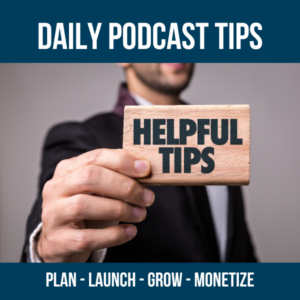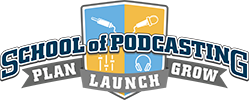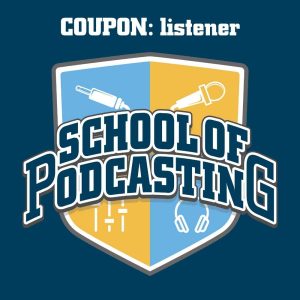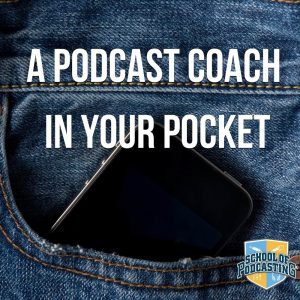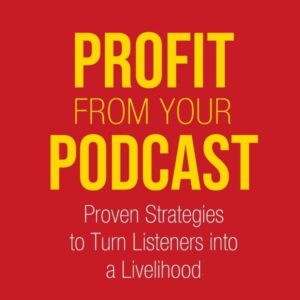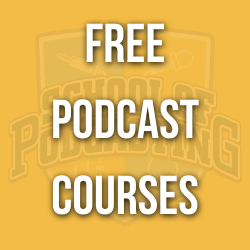
Welcome to episode 563 of the School of Podcasting
Have you ever had a problem with something, and then when you stated your problem out loud the answer came to you as you were saying it? You can use that exercise to help your podcast. I recently read about 80% of the book Out on the Wire: The Storytelling Secrets of the New Masters of Radio by Jessica Abel. Jessica went DEEP INSIDE NPR and the creators of This American Life and took lots of notes and shared them. One strategy they use to shape a story is to say out loud, “I'm doing a story about X, and what is interesting about it is Y. They say it's important to do this out loud to a real person.
Then to shape your story you use this tool, Somebody does something because of ____(their motivation) but _____(a challenge). If you can't answer the but, then ask yourself, “What do I have?”
They have another exercise where their focus setting may be something like. “This happened _______, then this ____, then this ____, and you would #$%&! believe it but ____. And the reason that is interesting to every single person walking on the face of the earth is ______.
This is where I draw the line. Sure we want everyone to like our episode, but that is NOT going to happen. If you try to make a podcast that is interesting to every single person, you will go crazy. Keep in mind these people are telling stories, and stories are powerful, but in certain circumstances, they don't really fit.
For example, Many podcasters want to make money with their podcast (motivation) but only 10% of podcasters get enough downloads to get big named sponsors. Then this guy start a podcast about horses, and you won't believe it but he got a sponsor when he had less than 100 downloads per episode. He added more and more shows and called it a network, and ignored the CPM model brought over by radio, and now he is making a full-time living with his podcast. The reason this is important is dynamic ad insertion is paying very low rates and uninformed podcasters may take those fees because they feel they can't get a sponsor without huge downloads.
If I'm interviewing technology, it may be a piece of technology that eliminates the challenge. Some podcasters have a hard time sharing promotional material with their guests, but podhero.io makes it easy.
Your intro Can Make or Break Your Podcast
This is from the Book Ted Talk by Chris Anderson
Zak Ebrahim did a TED Talk, and he originally was going to start his talk with this paragraph:
I was born in Pittsburgh Pennsylvania in 1983 to a loving American Mother and an Egyptian Father who tried their best to create a happy childhood for me. It wasn't until I was seven years old that our family dynamic started to change. My father exposed me to a side if Islam that few people (including the majority of Muslims) get to see but in fact when people take the time to interact with one another it doesn't take long to realize that for the most part, we all want the same things out of life
The folks at TED brainstormed and help him come up with this opening Paragraph:
On November 5th 1990 a man named El Sayyid Nosair walked into a hotel in Manhattan and assassinated Rabbi Meir Kahanethe leader of the Jewish Defense league. Nosair was found not guilty of the murder, but while serving time on lesser charges he and other men started planning attacks on a dozen New York City landmarks including tunnels, synagogues, and the united Nations Headquarters. Thankfully those plans were foiled by an FBI informant. Sadly the 1993 bombing of the World Trade Center was not. Nosair would eventually be convicted for his involvement in the plot. El Sayyid Nosair is my father.
The audience was riveted See video https://youtu.be/lyR-K2CZIHQ
Leave Out Stuff That You Don't Need
Here is an example from the TED Talks book byChris Anderson(also available on Audible)
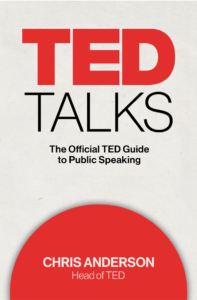 Once, when I was eight years old, my father took me fishing. We were in a tiny boat, five miles from shore, when a massive storm blew in. Dad put a life jacket on me and whispered in my ear, “Do you trust me, son?” I nodded. He threw me overboard. [pause] I kid you not. Just tossed me over! I hit the water and bobbed up to the surface, gasping for breath. It was shockingly cold. The waves were terrifying. Monstrous. Then . . . Dad dived in after me. We watched in horror as our little boat flipped and sank. But he was holding me the whole time, telling me it was going to be OK. Fifteen minutes later, the Coast Guard helicopter arrived. It turned out that Dad knew the boat was damaged and was going to sink, and he had called them with our exact location. He guessed it was better to chuck me in the open sea than risk getting trapped when the boat flipped. And that is how I learned the true meaning of the word trust.
Once, when I was eight years old, my father took me fishing. We were in a tiny boat, five miles from shore, when a massive storm blew in. Dad put a life jacket on me and whispered in my ear, “Do you trust me, son?” I nodded. He threw me overboard. [pause] I kid you not. Just tossed me over! I hit the water and bobbed up to the surface, gasping for breath. It was shockingly cold. The waves were terrifying. Monstrous. Then . . . Dad dived in after me. We watched in horror as our little boat flipped and sank. But he was holding me the whole time, telling me it was going to be OK. Fifteen minutes later, the Coast Guard helicopter arrived. It turned out that Dad knew the boat was damaged and was going to sink, and he had called them with our exact location. He guessed it was better to chuck me in the open sea than risk getting trapped when the boat flipped. And that is how I learned the true meaning of the word trust.
EXAMPLE 2: SAME STORY WITH TOO MUCH DETAIL AND NO EMOTION
I learned trust from my father when I was eight years old and we got caught in a storm while out fishing for mackerel. We failed to catch a single one before the storm hit. Dad knew the boat was going to sink, because it was one of those Saturn brand inflatable boats, which are usually pretty strong, but this one had been punctured once and Dad thought it might happen again. In any case, the storm was too big for an inflatable boat and it was already leaking. So he called the Coast Guard rescue service, who, back then, were available 24/7, unlike today. He told them our location, and then, to avoid the risk of getting trapped underwater, he put a life jacket on me and threw me overboard before jumping in himself. We then waited for the Coast Guard to come and, sure enough, 15 minutes later the helicopter showed up—I think it was a Sikorsky MH-60 Jayhawk— and we were fine.
The first version is a story of trust and emotion. The second version has tangents left and right and is filled with information that doesn't back up the main story. If we “X Y” this, My Dad and I went fishing, but he threw me overboard. And this is interesting as we all need to learn how to trust people. The second version doesn't even bring up the key sentence for me, “Do you trust me son?”
In the book Secrets of Dynamic Communications: Prepare with Focus, Deliver with Clarity, Speak with Power author Ken Davis states, “To make it as clear and powerful as possible, it is necessary to know exactly what you want to accomplish and then keep only material that will contribute to the objective.” He also states, If you aim at nothing, you will hit it every time. Another strategy is that if you just throw enough things at your audience, one of them is bound to have an impact.
Niel J. Guilarte Editor of The Messengers: a Podcast Documentary
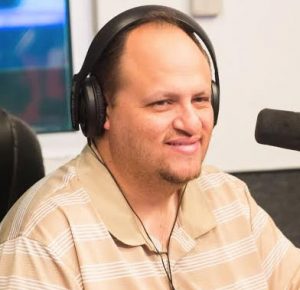 Niel who is the editor the The Messengers: a Podcast Documentary as well as the host of All Things Post, and the owner of Wildstyle Media, and star of his YouTube Channel shares some of the non-traditional items he has shot video to get experience and talk about the steps of assembling your story.
Niel who is the editor the The Messengers: a Podcast Documentary as well as the host of All Things Post, and the owner of Wildstyle Media, and star of his YouTube Channel shares some of the non-traditional items he has shot video to get experience and talk about the steps of assembling your story.
- Know who your audience is
- Take inventory of what you have
- Come up with the story, the message you want to share
- Follow your gut
- Don't be afraid to start over, or get a different set of ear/eyes
In the same way that you don't take your car to the dentist to get it fixed, Niel thinks business people should stop editing their show and pass that off to editors to help them tell their story. Niel uses Dropbox to swap files back and forth with his clients as well as Frame.io
One of the common mistakes that podcasters make that Niel has to edit out is letting their guest go on weird tangents in the interview that end up on the chopping floor.
Check out Niels awesome videos (his wedding videos are awesome) at www.wildstylemedia.net and his podcast All Things Post (about Post Production) at www.allthingspost.net
What is the Smallest Amount You Would Take From a Sponsor for One Episode?
If I could do this again I would. I was looking for a number like “16” not a range of an EPISODE (not a month) after 30 days. So look at an episode from 30 days ago and tell me how many downloads it has. Then when I asked what was the least amount, I'm not sure I was clear enough to say PER EPISODE. So I would call this survey a wash. I thank all 37 people who replied.
Are you interested in making money from your podcast?
89.2% Said Yes.
10.8% said no.
How Many Downloads Do You Get Per Episode After 30 days, and what is the smallest amount of money you would take from an Advertiser.
7 Respondents had 100 downloads or less, and they said they would take anywhere from $5-$500. The people close to 100 downloads per episode were looking for $25-35.
3 Respondents got between 101-200 downloads. Two were not interested in making money, and the third wants at least $10.
3 Respondents had between 201-300 downloads and said they would take $5, $10.
1 Respondent had between 300-400 downloads said they were highly relevant and would take $500.
1 Respondent had between 401 -500 downloads said they would take $200
1 Respondent said they had 600 downloads per episode and would take a minimum of $10
1 Respondent said they had 800 downloads per episode and would take a minimum of $150
1 Respondent said they had 900 downloads per episode and would take a minimum of $50 for advertisers but on Patreon I will mention a fans business for $25
1 Respondent said they had 1000 downloads per episode and are getting (currently) $50
1 Respondent said they had 1000 downloads per episode and would take $225
1 Respondent said they had 1250 downloads per episode and would take $50
1 Respondent said they had 2000 downloads per episode and would take $50
1 Respondent said they had 2400 downloads per episode and would take $20
2 Respondents said they had 2500 downloads per episode and would take $25. The other is getting $100
1 Respondent said they had 3000 downloads per episode and would take $50
2 Respondent said they had 4000 downloads per episode and one is getting $250, the other wants $300
1 Respondent said they had 4673 downloads per episode and will take $1 per second (30-second ad, $30)
People Who Said They Have Sponsor
1 Person had 50 downloads an episode and is getting $250 ( I would think this has to be a month or a typo)
1 Person had 1000 downloads an episode and is getting $50 ($50/cpm)
1 Person had 2500 downloads an episode and is getting $1o0 ($40/cpm)
1 Person had 4000 downloads an episode and is getting $250 ($62.5/cpm)
1 Person had 4763 downloads an episode and is getting $1/sec (one spot $30) ($6.29/cpm)
1 Person had 10000 downloads an episode and is getting $55 ($5.5/cpm)
1 Person had 50000 downloads an episode and is getting $125 ($2.5/cpm)
Next Month's Poll:
Have you ever started a podcast? (Yes or No)
If no, what is holding you back?
Are you still producing that show? (Yes or No)
If Yes:
What are the name of the show and the web address?
Why do you podcast?
If No:
What was the name of your show?
Why did you walk away from podcasting?
Go to www.schoolofpodcasting.com/contact. If you use email, please put 468 in the subject line.
Join the Podcasting Community at The School of Podcasting
Educate – Collaborate – Meet Your Fate
Tutorials, Live Coaching, Private FaceBook Group, Priority Email Support
30-Day Money-back Guarantee
www.schoolofpodcasting.com/start
Mentioned in This Episode
Out on the Wire: The Storytelling Secrets of the New Masters of Radio
TED Talks: The Official TED Guide to Public Speaking (available on Audible)
Secrets of Dynamic Communications: Prepare with Focus, Deliver with Clarity, Speak with Power
The Messengers Documentary DVD
Glenn the Geek Episode 1 of (Horse Radio Network)
Start Your Podcast at the School of Podcasting
